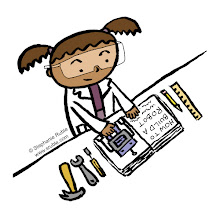I’ve been trying to decide what the theme was this year. There’s
usually a theme that I notice that runs through comments that several
speakers make over the four days. There are probably several themes that
could be taken from the conference, but the theme that I notice usually
reflects where I am in my work and what I need to concentrate on when I
return home. It helps me to take the inspiration from the conference
and shape it into something tangible.
The theme for me this year was, “building your career.”
(Note: all comments are paraphrased unless there are quotes around them. I wasn’t able to write notes as fast as people talked.)
Sherman Alexie talked about career in his amazing
opening keynote speech, how your writing affects the readers and how
your family and friends will be neglected if you’re doing it right.
David Wiesner talked about his career so far in his
inspiring keynote speech. He showed how things that he’d worked on many
years ago kept appearing in his work until he found the right book for
them. He also talked about stories and dummies that didn’t work
sometimes morphed into other stories that did work.
“Be open to all that stuff floating around out there and the cool stuff you liked as a kid and the stuff you think is cool now.”
David’s breakout session was excellent too. The best advice was to
always think of it like a book. He uses a blank book that’s the size and
shape of the final book and swaps out the images at every stage,
sketches, final drawings, finishes, so that he’s always seeing the page
turns and reading it as a book.
“Observational drawing is the basis for everything we do.”
Steven Malk gave my favorite workshop of the conference. Some of his career advice for illustrators (most of which applies to authors too):
“Have a career plan and know what you want to do. All of your decisions should help you work towards that goal.”
“Don’t dibble dabble. Decide you want to build a career and completely jump in.”
“Only you can own your career decisions. Each decision you make affects your career.”
“Make each decision in a calm, rational way, not a shot in the dark kind of way.”
Writing and illustrating is to your advantage. Knock their socks off
with the dummy. Take the time to do a great job and really show your
vision for the book. You need to have a finished dummy, not just a few
finishes.
Elizabeth Parisi made a comment about being
realistic about what your skills are (cover artist, PB artist, etc.).
Wish I had been able to capture the exact quote, but she went on to the
next thing too quickly.
A bit of good news for illustrators: MG covers are still about 95%
illustration and they are using more interior illustrations since Hugo
Cabret by Brian Selznick.
Artist mistakes: going straight to final without sketches and
surprising the AD with major changes between approved sketches to final
illustrations.
Start with illustration or writing and get your foot in the door with
one thing. Don’t try to jump into both. Pick the one that you really
love and do that first.
Eve Bunting: When she finishes a book, she thinks, “Is this worth saying?”
Dan Yaccarino says yes to everything, whether he
knows how to do it or can do it, or not (animation, package design,
etc.). When people ask if he has a story to go with an image in his
portfolio, he says yes, even if he doesn’t. Then he goes home and writes
it and sends it out.
Dan also talked about doing art that he wanted to do and not just what he thought he should do.
Holly Black: “Read enough that you’re part of the
conversation.” (During her keynote, on reading fantasy if writing it,
but could apply to any area of children’s books.)
Holly’s breakout session was really great too, along the lines of
Steven Malk’s session, but for writers. I wish I had seen the whole
session, but I came in half way through.
“Respect your process.” Put together a plan that works for you and
remember to plan for trips and other times when you’re not going to be
able to get as much done.
“You need to include some space in your schedule to stay inspired
(continuously), so you’re not just work, work, work, project, project,
project.” Do what ever inspires you, reading, walking, etc. If you don’t
do that, you’ll burn out quickly.
Richard Peck: “Always write the story going forward because the characters can’t go back.”
Elizabeth Law: She talked about respecting a MG
writer who said that she wasn’t comfortable writing YA so she wrote MG
and that theme came up a couple of times.
“Know who you are writing for and why someone would want your book,
but don’t force yourself to write something because you think it will
sell or that you’re not comfortable with.”
Encouraged everyone to use social marketing to connect, unless it keeps you from doing your own work.
Linda Sue Park: “Love the story for itself, even if
you’re the only one that ever reads it.” Linda Sue said that her editor
has turned down novels since she won the Newbery, so she has to believe
that it’s not wasted time and love the thing for what it is.
Arthur Levine: “Crossing genres is easier with one long term editor … instead of selling in to another house based on past books.”
* There were too many speeches, quotes, and comments to write them
all here, but I tried to highlight the ones I thought would be the most
useful or inspiring.


No comments:
Post a Comment